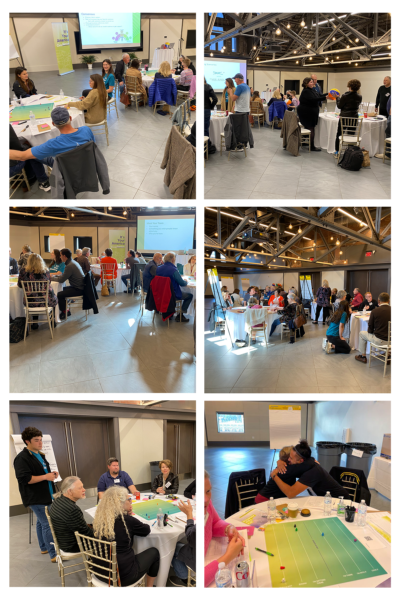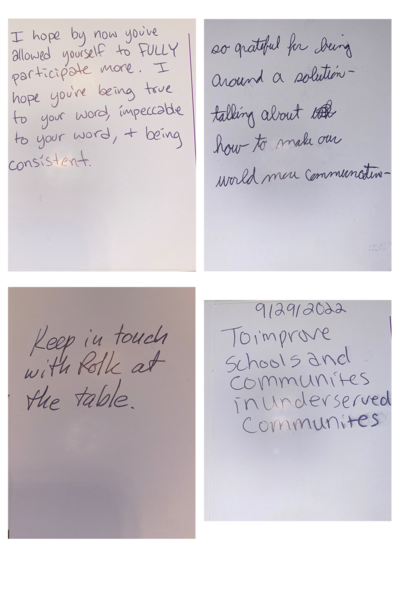It’s Your America: Lexington 2022 Report
Overview
Across three events in September 2022, 86 people from the Lexington area teamed up for an experiment in better government. They were participants in It’s Your America, a deliberative democracy initiative that brings together people from across the political spectrum to learn about, discuss, and tackle critical national issues together. Civic Genius co-hosted these events with CivicLex, a nonprofit civic education organization building civic health through education, media, and relationship building. This was part of an ongoing series of citizen policy deliberations on digital disinformation and free speech that Civic Genius is hosting in communities across the country in partnership with YOUnify and the Convergence Center for Policy Resolution.
Participants came from a wide variety of backgrounds, with significant diversity of ideology, race, and income. Civic Genius partnered with CivicLex to deploy a community organizing model to educate people about the event and invite them to participate. Our teams worked with dozens of local and national leaders and we’re grateful to those who spread the word, including Country First, Kentuckians for the Commonwealth, NAACP, National Association of Social Workers, and the University of Kentucky.
Special thanks to Deputy Mayor Steve Kaye and Council Member Susan Lamb for sharing this event with their communities, and joining us to participate, and to Hannah LeGris, Liz Sheehan, and Richard Mahoney for their support. Additional thanks to Kakie Urch and Shannon Oltmann, who joined us for podcast interviews that got the community thinking before the deliberation.
-
To scale the impact of citizen deliberation, Civic Genius is working with several key organizational partners.
These events would not have been possible without CivicLex’s deep roots in the community, strong reputation as a trusted convener, detailed knowledge of local issues and dynamics, and tremendous capacity to attract residents at every level of civic engagement. CivicLex was instrumental in bringing stakeholders with a wide variety of perspectives and experiences to the tables.
Another innovative partnership brings together citizens, experts, leaders, faith-based voices, and policymakers to develop policy recommendations that incorporate an exciting range of knowledge, perspectives, and values. This effort is led jointly by Civic Genius, Convergence Center for Policy Resolution, More in Common, and Interfaith America, four nonpartisan, nonprofit organizations that work to move past political polarization. Leveraging each organization’s unique expertise in bringing diverse stakeholders to the table, Civic Genius, Convergence, and Interfaith America are leading participants in deliberative processes designed to identify and build common ground on this complex issue, and then mobilize them to take action. Civic Genius is engaging diverse grassroots audiences in select communities across the country. Convergence is convening experts and stakeholders at the national level, and Interfaith America is bringing to both the perspective of interfaith voices. While each of these deliberations would be potent on its own, the partnership is creating a unique opportunity for grassroots and grasstops organizations to share perspectives, knowledge, learnings – and creating a powerful feedback loop that furthers understanding on all sides.
-
Civic Genius is passionate about working with local media outlets, which comprise a crucial institution in our communities. Local print, radio, and television were important validators in Lexington and a number of participants noted that they learned about the event from their local media:
- The Lexington Herald-Leader ran an editorial, as well as an op-ed by Civic Genius’ executive director, in advance of the event.
- WUKY, Lexington’s NPR affiliate, aired an interview with leadership from Civic Genius and CivicLex.
- RadioLex aired several spots promoting the event, including an interview with Civic Genius. The station also aired two Civic Genius podcast episodes with University of Kentucky faculty members:
- Kakie Urch: Associate Professor, College of Communication and Information at the University of Kentucky
- Shannon Oltmann: Associate Professor, School of Information Science at the University of Kentucky
- WKYT aired a television segment with video from the first event and an interview with Civic Genius.
This was transformative for me!
Citizen Deliberations
Participants spent three hours in small groups of six people, going through a process designed to help them create solutions on the topic of digital disinformation and free speech. Over the course of the event, the groups:
- Got to know each other by discussing nuances in their own ideological views and experiences.
- Discovered shared values.
- Learned about the issue and the tensions of managing digital disinformation while protecting free speech.
- Brainstormed solutions and discussed the pros and cons of each.
- Crafted and pressure-tested common ground solutions.
- Found consensus on solutions.
While previous It’s Your America events lasted for six hours, Civic Genius experimented in Lexington with a shorter event designed to be more accessible to the public while still offering a strong introduction to issue deliberation.
-
Working in their small groups, participants began by listing values that would guide their deliberations for the day. The room’s top values were:
- Honesty (15 nominations)
- Inclusivity (12 nominations)
- Access (10 nominations)
- Free Speech (9 nominations)
- Truth (9 nominations)
- Accountability (8 nominations)
- Respect (8 nominations)
- Transparency (8 nominations)
Others included:
- Compassion (7 nominations)
- Critical thinking (7 nominations)
- Circumspection (6 nominations)
- Non-tribalism (6 nominations)
- Willingness to discuss (5 nominations)
- Accuracy (4 nominations)
- Care (4 nominations)
- Fairness (4 nominations)
- Patience (4 nominations)
- Consensus (3 nominations)
-
As participants learned more about the topic and the various angles from which they could approach solutions, they brainstormed thoughts and ideas that built on their top values. Brainstorming centered on several areas:
Responsibility & Accountability — Tech Companies
- Reform Section 230 / hold social media companies accountable
- Currently platform is not liable
- Changing algorithms to not promote misinformation
- Bring back the chronological news feed
- Creation of an algorithm to predict impact certain social media posts may have
- Redesign algorithms
- Emphasize corporate partnerships so that harmful content is responded to quickly
- Create advisory committee to determine legitimate content
Responsibility & Accountability — Individuals
- Use the SIFT Method
- Individuals should challenge others’ opinions
- Individuals should read critically
- Be open to opposing viewpoints
- Relies on self-policing. The people who are the problem aren’t doing this
- Trace sources to original content
Transparency & Consumer Choice
- Transparency around algorithms, followed by amplification to the public
- Transparency in information, sources, and finances of platforms and publishers
- Opensource key algorithms
- Opensource for developers
- Public debate around which algorithms are wanted, determining harms to different communities
- Require social media companies to open their platforms to competition
- Federal government should use antitrust laws to break up large tech companies so consumers have choices to take their business elsewhere if we don’t like their practices
Education & Media Literacy
- Improving digital media literacy in schools at the local level
- Differentiating between opinion and fact
- Schools should teach skills about safe, responsible internet use
- Schools should teach objectivity
- Civic engagement education
- Schools should focus on objective decision-making by exposing students to alternate ideas allowing them to reach their own conclusion
- Schools should teach internet literacy
- Individual critical thinking via formal/informal education
- School boards create a media literacy curriculum
- Libraries should increase access to information
Data Privacy
- Opting into data sharing rather than opting out should be the default
- Social media companies track activity via other internet accounts to amplify consumerism, making the use of that data more accessible to other users.
- Better data privacy laws so there is not so much data to use to decide for us what we see
Incentives
- Rethink/change the media revenue model
- Tech companies renegotiate revenue strategies
- Does the business model for journalism need to change?
Prioritize Free Speech
- Multiple opinions should be spread
- Digest news from different sources
- Are we free speech absolutists?
- What counts as hate speech?
Focus on People
- Have a societal shift in culture that doesn’t focus on profits over personal well-being
- Individual reorientation around love, care, and healing
- Self and collective care and antiracism
-
Finally, with advice and guidance from the Civic Genius team, participants refined their ideas and crafted them into actionable solutions. In many cases, multiple groups generated similar solutions, suggesting that participants found common ground both within and among their small groups. Groups proposed some novel solutions, as well, with some participants noting that learning new information about the topic enabled them to think creatively.
One area where groups landed on different approaches was Section 230 of the Communications Decency Act of 1996. Several groups sought modifying Section 230, while one suggested repealing it and another felt it was beneficial as written and advocated for leaving it intact.
Here are solutions around which groups built consensus, and who they thought should implement the solution:
Recommendations for Tech/Social Media Companies
- Make algorithms open source to offer transparency to the public. Public and private “watchdogs” must also remain transparent.
- Require users to include sources of content (e.g. a bibliography) and select from a drop-down menu whether a post is fact, opinion, humor or fiction.
- Promote human interest stories to encourage compassion.
- Create “stopgaps” that slow down spread of posts.
Recommendations for Individuals
- Identify the source of information when posting online.
- Hold advertisers accountable by publicizing that they promote social media false stories, held accountable through consumer buyouts.
- Improve critical thinking skills, via both formal and informal education.
- Moderators of open forums on social media should be stronger.
Recommendations for Government
- Enact a law that allows tech companies to either opt in or opt out of Section 230, creating Section 230 “protected companies.” Companies protected by Section 230 would need to allow users to toggle and choose their algorithm. Companies not protected by Section 230 would be held accountable and face legal liability for harmful content on their platforms.
- Modify Section 230 to make tech companies liable when they fail to moderate content sufficiently.
- Repeal Section 230 so that tech companies can be held liable for posts on their platforms.
- Leave Section 230 as it is. If posts cause violence or harm, the user who posted it is responsible.
- Require social media companies to publish their algorithms.
- Pass legislation requiring social media companies to make their algorithms public so that there could be a public debate and change could result.
- Require tech companies to be more transparent about the entities that use personal data provided to social media platforms, and how those entities use it. This should include the creation of a benchmark for security and transparency.
- Fund K-12 school curriculum around critical thinking skills, media literacy, and civility.
- Fund adult curriculum around critical thinking skills, media literacy, and civility.
- Require advertisers to disclose who or what they are promoting.
- Make social media companies public utilities. Content would be moderated in transparent ways, and suppressed content could be accessed in a legally controlled way. Data would be owned by the public or by individuals.
- Bring kindness training into schools to stop the problem before it hits social media.
I wish we could do this for every single issue we're talking about in this country.
Citizen Deliberation In Color

Next Steps
Deliberating and crafting smart, nuanced, common ground policy is only the first step; next, It’s Your America participants in Lexington are organizing to take action. YOUnify and Civic Genius hosted the first Lexington chapter meeting on October 17, where participants learned about effective local organizing and identify skills and resources they need, such as an advocacy training or an op-ed writing workshop.
Before leaving the event, participants wrote postcards to their future selves, to be delivered a few weeks later. Here are some examples:
